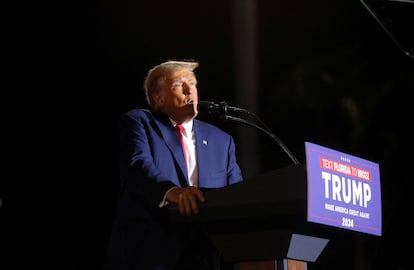Judge Chutkan rejects Trump’s presidential immunity in Washington election case
The office of president “does not confer a lifelong ‘get-out-of-jail-free’ pass” the magistrate wrote in dismissing the petition


U.S. District Judge Tanya Chutkan has rejected the petition of former president Donald Trump to shelve the electoral case he faces in Washington. Trump argued that he enjoyed absolute immunity due to his status as president, because the indictment was based on actions he took while in office. In this case, the former president is charged with four felonies related to his attempts to invalidate the legitimate results of the November 2020 elections, which he lost to Joe Biden.
The dismissal of the petition came as no surprise, but Trump’s lawyers can now appeal to the appeals court and, ultimately, to the Supreme Court. That would allow Trump, at the very least, to delay the process so that the trial does not begin in early March, as scheduled. With his dilatory strategy, it may even be delayed until after the November presidential election. If Trump were to win that election, he could maneuver to have the Justice Department drop its indictments. In an extreme case he could even pardon himself.
For the time being, Judge Chutkan has rejected the near-absolute immunity that Trump intended to cling to. In her ruling issued Friday, the name Nixon appears 24 times. The Watergate affair, which led to Richard Nixon’s resignation as president in 1974, was followed by a preemptive pardon by his successor in the White House, but the episode serves to show that Trump’s predecessors did not share his thesis of absolute immunity.
“The Constitution’s text, structure, and history do not support that contention,” Chutkan wrote in her ruling. “No court — or any other branch of government — has ever accepted it. And this court will not so hold. Whatever immunities a sitting President may enjoy, the United States has only one Chief Executive at a time, and that position does not confer a lifelong “get-out-of-jail-free” pass.”
“Former Presidents enjoy no special conditions on their federal criminal liability,” the judge’s legal argument continues. " Defendant may be subject to federal investigation, indictment, prosecution, conviction, and punishment for any criminal acts undertaken while in office.”
Trump’s 52-page motion filed with the Washington court in October began by noting that the president of the United States is the core of the system of government, the nation’s leader, the head of state and the head of government. “To ensure the President may serve unhesitatingly, without fear that his political opponents may one day prosecute him for decisions they dislike, the law provides absolute immunity for acts within the ‘outer perimeter’ of [the President’s] official responsibility,” his lawyers argued, citing several Supreme Court precedents, which may eventually be called upon to decide this case as well.
Breaking 234 years of precedent, the incumbent administration has charged President Trump for acts … at the heart of his official responsibilities as President,” argued the brief that Chutkan has dismissed.
Chutkan, a Barack Obama appointee, also rejects Trump’s claims that the indictment violates the former president’s freedom of speech, as his defense has argued. The judge notes that “it is well established that the First Amendment does not protect speech that is used as an instrument of a crime.”
“Defendant is not being prosecuted simply for making false statements but rather for knowingly making false statements in furtherance of a criminal conspiracy and obstructing the electoral process,” she contends, conceding that if prosecutors cannot prove beyond a reasonable doubt at trial that Trump knowingly made false statements, he will not be convicted.
The ruling was issued on the same day that the federal appeals court in Washington ruled in another case that lawsuits accusing Trump of inciting the Jan. 6, 2021, riots at the Capitol can go forward.
The appeals court has rejected Trump’s arguments that presidential immunity exempts him from liability in lawsuits brought by Democratic lawmakers and police officers. But the three judges left the door open for Trump to later claim and prove, as the cases progress, that his actions were taken in the exercise of his office as president.
Sign up for our weekly newsletter to get more English-language news coverage from EL PAÍS USA Edition
Tu suscripción se está usando en otro dispositivo
¿Quieres añadir otro usuario a tu suscripción?
Si continúas leyendo en este dispositivo, no se podrá leer en el otro.
FlechaTu suscripción se está usando en otro dispositivo y solo puedes acceder a EL PAÍS desde un dispositivo a la vez.
Si quieres compartir tu cuenta, cambia tu suscripción a la modalidad Premium, así podrás añadir otro usuario. Cada uno accederá con su propia cuenta de email, lo que os permitirá personalizar vuestra experiencia en EL PAÍS.
¿Tienes una suscripción de empresa? Accede aquí para contratar más cuentas.
En el caso de no saber quién está usando tu cuenta, te recomendamos cambiar tu contraseña aquí.
Si decides continuar compartiendo tu cuenta, este mensaje se mostrará en tu dispositivo y en el de la otra persona que está usando tu cuenta de forma indefinida, afectando a tu experiencia de lectura. Puedes consultar aquí los términos y condiciones de la suscripción digital.








































